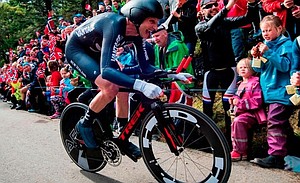3/28/2018

By Matt Majendie, for CNN
(CNN) -- For eight years Hamish Bond was unvanquished, winning double Olympic gold and seven world titles with rowing partner Eric Murray.
But what do you do when winning becomes routine? In Bond's case he decided he wanted to experience what losing felt like -- so the 32-year-old switched strokes for spokes and blades for blazing saddles with an ambitious target of winning a cycling medal at the Tokyo Olympics in 2020.
His first big test comes at next month's Commonwealth Games in Australia in the individual road time trial.
"Losing is almost refreshing," Bond said of his second sporting foray. "I've lost more cycling races than I've won. On the bike I'm the underdog, the dark horse. I like that."
That's not to say Bond does not have aspirations to stand atop the podium in April, merely a nod to the all-consuming nature of never tasting defeat for years at a time.
It turns out that winning relentlessly came with a cost.
"The pressure and expectation of winning started to get to me," he admitted. "It was a case that there was eight years riding on every race. The wins almost became like a tick box."
When he crossed the finishing line under the backdrop of Christ the Redeemer in Rio de Janeiro two years ago, his overwhelming feeling was not of joy but relief.
"Leading up to Rio, I just couldn't ignore the fact that we hadn't lost a race," he said. "Every time, people were having a crack at taking us down. I struggled a little bit with that."
The cycling switch
Even when Murray retired last May, Bond admitted in some ways it was easier to stick with the oars than it was to walk away but the sense of what was possible in a different lycra suit gnawed away at him.
"I want to be competitive against the very best in the world and target a medal in Tokyo," he says. "Whether that's realistic or not, I'll find out. If it's not, that will be disappointing but at least I've given it a crack. That first test of realism comes at the Commonwealth Games.
"And rather than carry on in the boat, I wanted to give the cycling some of my good years rather than the old man years. I reckon I've still got two or three good years left at it."
There is an almost refreshing simplicity to Bond's endeavor in taking on cycling's leading lights. He never cycled at school and only really dabbled with getting on a bike as part of his cross-training for rowing.
But he placed relatively highly against established national riders in New Zealand events and his interest was "spiked."
He has proved no slouch in the saddle. His national time trial title warranted Commonwealth Games selection and he finished 39th at last year's World Championships, all the more impressive as he suffered a puncture and the hilly course did not suit his 76 kilogram frame.
As Bond puts it he's "on the small side for rowing and heavy for elite biking," but his great strength is his power to weight ratio.
In the boat, he competed at about 89kg (196lbs) -- in contrast to crew member Murray's 100kg (220lbs) on the scales -- while he has got as low as 76kg (167lbs) on the bike. By comparison, four-time Tour de France winner Chris Froome rides at 66kg (145 lbs), a gargantuan difference.
"The memory fades and the brain's quite clever at dulling the pain but I feel like I'm working as hard," says Bond, as he reflects on which sports demands a tougher training regime.
"I'm doing more total hours than before but the rowing sessions were more intense."
Living out of a van
Even so when the sun is shining and the water is still there have been times when Bond pines for the easy movement across the water with blade in hand.
The demands of time trial riding also make cycling a more lonely existence -- 90% of his rides are partaken alone -- though Bond quips he doesn't have "to deal with other people on the bad days!"
The response to his endeavors have been 99% positive from the cycling community although he faced some accusations of being an "imposter." His win at the nationals has also helped the assimilation process.
To chase the required time trial races in the Kiwi winter, Bond relocated to the UK, traveling around in a transit van as he went from one race to the next.
Embraced by the UK's cycling and rowing communities alike, he also worked with Aerocoach, a business focused on aerodynamic testing and cutting edge cycling products.
Collaborating with Xavier Disley and his team, Bond estimates that pounding around the boards of Newport Velodrome in Wales, he reduced his drag by some 10%.
Whether that gives Bond the license to fulfill his cycling medal ambitions is another matter. He'll have a better idea of where he stands once the Commonwealth Games are over.
